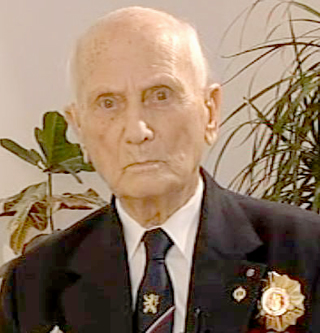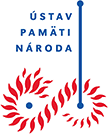Anton Petrák (1912 - 2009)

Biography:
“We had the only aim: to see our homeland free and clean the shame of those who had dishonoured us by the alliance with the German fascism.”
Anton Petrák was born on April 14, 1912 in Vienna to parents of a Czech origin. He grew up in the independent Czechoslovak state and was raised in accordance with the principles of religious, national, and political tolerance. He graduated from the military academy, was brevetted lieutenant of the Czechoslovak army and became the commissioned officer. Events preceding the year 1939 aroused his aversion for Nazism and after the forcible break up of Czechoslovakia, he decided to leave for the western front to fight in Czechoslovak foreign legions. Firstly he was a captain of the staff company in France where he trained recruits, but later he went to Great Britain. He enrolled for the forming Czechoslovak parachute unit and subsequently he worked as an instructor, trainer and interpreter. He was also the commander of the service weapons’ company and participated in military trainings. After the Normandy landings, he commanded the company in Dunkirk port. Marshal Montgomery honoured him because he managed to liquidate the German supply unit. After the war he came home to his parents and fiancée and as a company commander he finished his military studies and rose to the rank of major. As a former western front legionnaire he was inconvenient for the ingoing communist regime. He had to face the fabricated accusations of the anti-state activities and the high treason; he was interrogated cruelly and imprisoned as well. He was exonerated only after the year 1998 when he was accorded the rank of general. He gained a lot of honours and orders including The Most Excellent Order of the British Empire and French National Order of the Legion of Honour. Major general Anton Petrák died on February 7, 2009 in Bratislava.
Hlinka Guard and a Decision to Leave
“Since I was an officer in Bratislava garrison, I witnessed the formation of the Hlinka Guard. I recalled the situation when we were sitting in the hotel Grand and general Viest came to us and later our friend lieutenant Záhora came as well. Through the window of the hotel’s coffee bar we saw the guardsmen marching in the street. Even though not all of them were the members of the Hlinka Guard, everyone wore the boots and black uniform. We hadn’t heard what they shouted but it was well known that they declared their support to the Hitler’s totalitarianism; they persecuted Czechs and Jews and we also read in the newspaper or heard very often that many shops belonging to Jews were robbed. Then I decided I wouldn’t live in that ambience anymore.”
Short Stay in Turkey
“Well, we became the average and free Czechoslovaks who fought against Hitler and for setting the Czechoslovakia free. We could stop getting organized in pairs and were simply free in movement. During the day we had an opportunity to see the region, the Orient. There were camels as well, you know, the Orient in the real sense of the word. In the evening we had arrived to the city of Aleppo where we stayed overnight. Owner of the hotel in which we stayed was quite a strange man. It seemed that we had made a doubtful impression on each other. We got the room and as I was, I don’t want to tell the best of our group but rather good at French, I asked him if it was possible to use the hotel’s bathroom and pull ourselves together. And he agreed. He took me to that door, opened it and opened also the switch for turning the water on. There was just cold water flowing from the tap and I saw a little frog jumping up and down on the floor in that mud. Well, naturally, nobody of us wanted to have a bath or doing the personal hygiene then.”
Slovakia in Abroad: “Fascist Puppet State”
“There was nothing said or written about Slovakia in the first few years. Those people who wanted to know something about what was going on in Slovakia tuned in to the Bratislava radio station and listened to how Slovak people prayed in churches for the victory of the Third Reich. And as they said, “may God help us,” we could hear also, “wish other successes to Germans.” By the way, people in western countries didn’t speak about any celebrations, unfortunately. We heard about Slovaks only when Germans, I think, it was on June 22, 1941, attacked their ally, the Soviet Union. Then the world press and radio stations, you know, television hadn’t existed yet, wrote a lot about the German army which was advancing against the Soviet forces, furthermore, side by side with Slovakia labelled then as the “Slovak fascist puppet state.” Well, we weren’t glad to hear about it and we worried a lot about the fact that Slovakia was the state that became notorious in the world history.”
Liquidation of the German Unit and Getting Honours
“We came to that place and heard nothing but silence. Suddenly, I saw and heard something as we sat there crouched, hidden behind poles, everyone holding a machine-gun. We were crouched behind those poles awaiting our enemies. It didn’t take long and the wagon was drawing near. It returned along the poles where we were crouched. Well, I hadn’t thought about it for a long time. As soon as the wagon had passed we started to fire at their backs. Naturally, we couldn’t stay there because that firing had frightened them, so those people reacted to it; those Germans reacted to what had happened. The wagon disappeared… because the coachman had lost reins, he couldn’t hold the wagon and horses started to trot, so we could do nothing else but turn around and go back. And the result was that later we were honoured for doing that.”
In the Labour Camp
“I would like to mention one cruel experience that I considered to be the illustration of the communist regime. Once, I think it was about July 8, 1941, when the camp commander ordered our Jozefus, our kapo, to assemble all the officers and inmates, as we were called, to the place where the guard was standing with the radio receiver. And he opened it to make it well audible for us. It was tragic because that day they rendered the judgement in the case of Milada Horáková who was charged in an anti-state trial and sentenced to death. Well, it was horrible when not only we, but also pupils in the classrooms, their teachers or workers had to listen as well that the condemned woman should be executed as soon as possible and that they promised to meet other obligations. It was what communism looked like, where the President was a serial killer, sorry for this expression, but he was the only President who condemned a woman in our country, in Czechoslovakia.”
Attempt to Escape Revealed - Interrogation and Beating
“And the commander stood in front of me and told: ‘You wanted to escape.’ I responded: ‘Yes, I wanted.’ ‘Where?’ ‘Home. To see my family, I hadn’t heard about my parents for a long time.’ He slapped me in the face once, twice. On my right side, there stood that youngster, on the left there was Mirek. ‘I will show you (occasional slap in the face, interrogation), just to let you know… Who helped you?’ ‘Nobody.’ ‘You will reveal it. Just take that chair.’ The commander was sitting behind that chair. ‘Bring it and put it on the floor. Put the backrest on the floor, kneel between the chair’s legs, and grasp the backrest!’ Kohlíček came up to me from the other side and clamped my head with his knees. On his right side, there stayed the youngster and on the left… the man who had that belt. He took it down and Mirek, who had that belt in his office on hanger, took it from there. The commander clamped my head with his knees and battering could start. They used the belt with buckle to batter me... I wasn’t able to move in that chair and I had to withstand it as long as I could. They battered me helter-skelter; they didn’t mind where and how, they just battered me. When they thought it was enough, they told me: ‘Get up.’ However, I couldn’t. My body was full of the bloody and open wounds caused by that belt’s buckle. And my head as well. I sweat, I was dirty and my condition wasn’t tempting at all.”
Released from Prison under Weird Circumstances
“We lined up in an alphabetical order. So when it was my turn, I came up and they asked me that ordinary question they used to ask everyone, why I got to the camp. There were two chairmen of the committee and one of them said: ‘Your arrest in the camp was wrongful; it was general Reicin who sent you here, and who purposely influenced the conditions in the camp to make you hate the democratic people’s state and to have an opportunity to involve you in the coup that he had planned. Reicin has been arrested and you are about to be released now, but we warn you, don’t try to take advantage of your release, don’t ask for any rehabilitation because any of these activities could be considered as an anti-state activity.’ Later we came to know from the narrations that all the men released from the camp got the same warning.”
The story and videoclips of this witness were put together and published thanks to the financial support of EU within the programme Europe for Citizens – Active European Remembrance.

